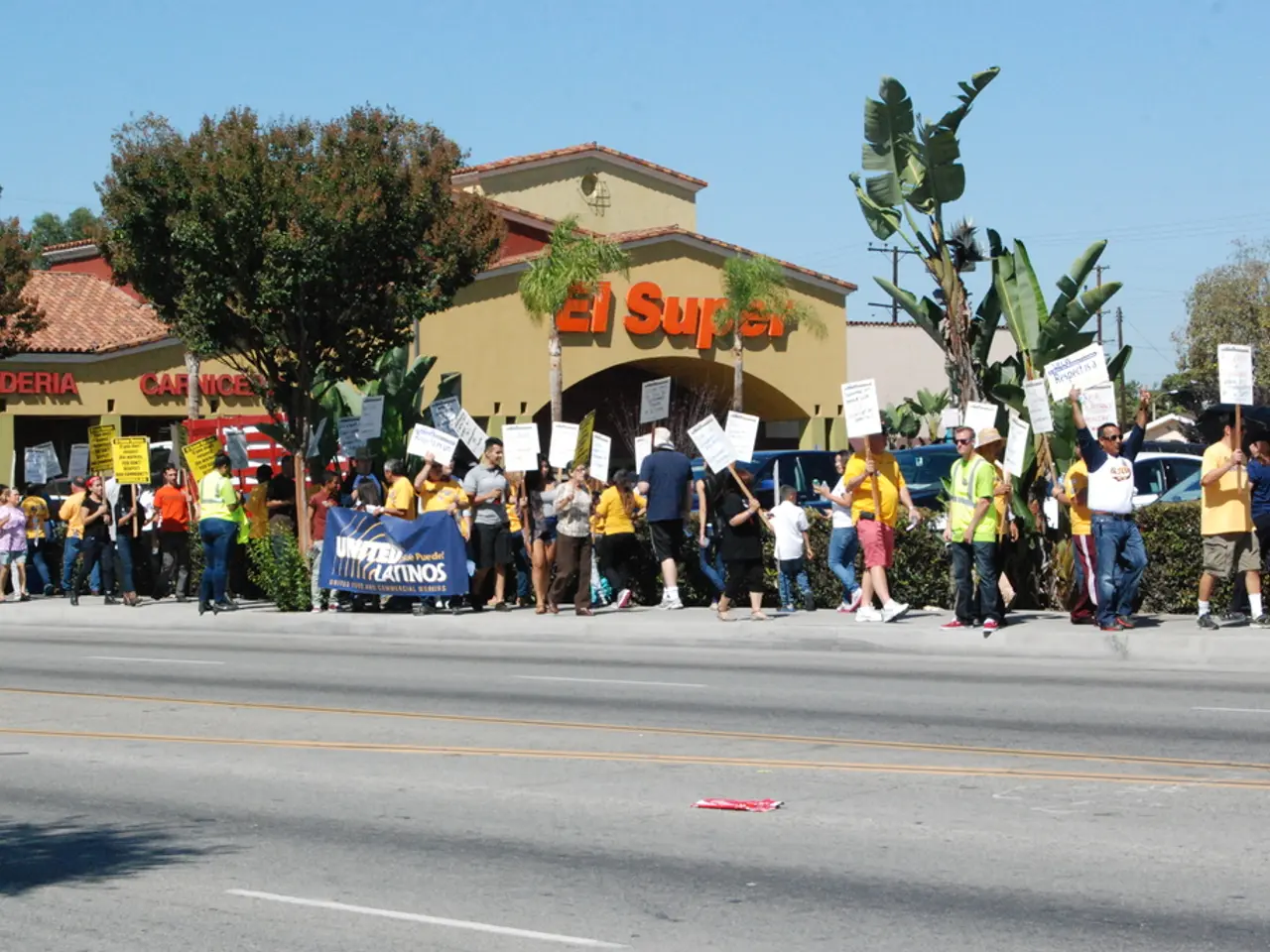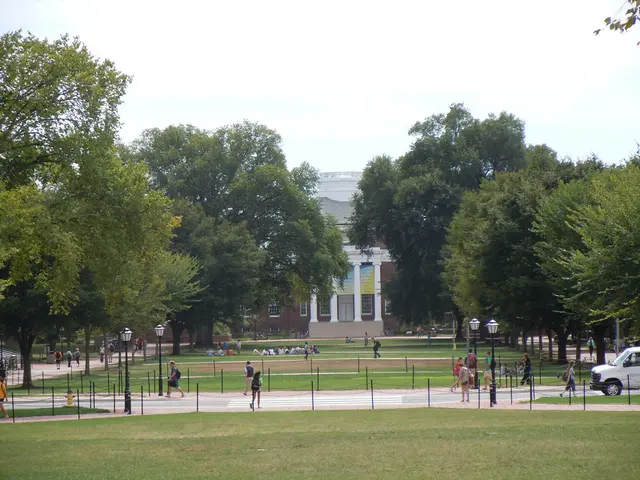"The significant growth" of youth sovereignty movement
In a striking shift, the trend in support for Quebec independence is showing stronger backing among younger Quebecers, according to recent polls. The CROP poll conducted in July and August among 1,000 respondents found that 56% of those aged 18 to 34 now support Quebec independence, the highest level among all age groups [1].
This youthful surge in support is notably higher compared to older demographics. Support is at 44% for those aged 35 to 54 and 37% for those 55 and older [1]. Overall, 44% of Quebecers across all ages support independence, while 56% oppose it.
The increased support among the younger generation is attributed to economic concerns such as housing affordability and unemployment. Some young Quebecers feel that federal policies have poorly addressed these issues, making independence appear as a viable solution to protect Quebec's cultural and social interests [2].
However, critics warn that this support may be driven more by emotional appeals and social media influence than by a full consideration of economic consequences [2].
The renewed enthusiasm for sovereignty among young people was first noted in a Léger poll in June. Singer Lou-Adriane Cassidy and young rapper kinji00, who are popular among young people for their sovereignty-themed songs, have also contributed to this growing sentiment [1].
Regionally, support varies. It is lowest in the Montreal metropolitan area (38%), moderate in the Quebec City area (45%), and highest in the rest of the province (49%) [1].
Jacques Beauchemin, associate professor at UQAM, observes that these figures are "very encouraging" for sovereignists and represent a "significant uptick on the Yes side" [1]. Guillaume Rousseau, director of applied law and politics programs at the University of Sherbrooke, is struck by "the strength of the Yes among young people" and hasn't seen such support since the sponsorship scandal in 2002 or even since the second referendum period [1].
Alain Giguère, president of the CROP firm, attributes this renewal to a "disillusionment with Ottawa's ability to do anything for their lives" [1]. However, Rousseau warns against overestimating the current level of support for Quebec independence, citing historical precedents [1].
In a hypothetical referendum, only 41% of respondents would vote or be tempted to vote "Yes" for independence, according to the CROP survey [1]. Support for sovereignty is higher in the Quebec City metropolitan area (45%) and the rest of the province (49%) compared to the Montreal metropolitan area (38%) [1].
Notably, support for sovereignty is higher among francophones (50%) compared to non-francophones (22%) [1]. The "Génération OUI" podcast host, Marc-Antoine Lemay, notes a significant increase in young people's support for sovereignty compared to two or three years ago [1].
In summary, the trend is a growing pro-independence sentiment especially pronounced among younger generations and francophones, while older and non-francophone demographics remain less supportive [1][2].
[1] CROP Poll, July-August 2022 [2] Various news sources, June-August 2022
- The trend of Quebec independence shows stronger backing among younger Quebecers, with 56% of 18-34-year-olds expressing support, according to a CROP poll from July to August 2022.
- Support for independence drops to 44% for those aged 35 to 54 and further decreases to 37% for those aged 55 and over.
- Across all ages, 44% of Quebecers support independence, while 56% oppose it.
- Economic concerns like housing affordability and unemployment have contributed to the increased support among young Quebecers.
- Critics argue that this support might be driven more by emotional appeals and social media influence than a full consideration of economic consequences.
- The surge in support for sovereignty was first observed in a Léger poll in June 2022.
- Singer Lou-Adriane Cassidy and young rapper kinji00, known for their sovereignty-themed songs, have also contributed to this growing sentiment.
- Support for independence is lowest in the Montreal metropolitan area (38%), moderate in the Quebec City area (45%), and highest in the rest of the province (49%).
- Jacques Beauchemin, associate professor at UQAM, finds these figures "very encouraging" for sovereignists.
- Guillaume Rousseau, director of applied law and politics programs at the University of Sherbrooke, notes the "strength of the Yes among young people," a level not seen since the sponsorship scandal in 2002 or the second referendum period.
- Alain Giguère, president of the CROP firm, attributes this renewal to a "disillusionment with Ottawa's ability to do anything for their lives."
- Rousseau, however, warns against overestimating the current level of support for Quebec independence, citing historical precedents.
- In a hypothetical referendum, only 41% of respondents would vote or be tempted to vote "Yes" for independence, according to the CROP survey.
- Support for sovereignty is higher in the Quebec City metropolitan area (45%) and the rest of the province (49%) compared to the Montreal metropolitan area (38%).
- Notably, support for sovereignty is higher among francophones (50%) compared to non-francophones (22%).
- Marc-Antoine Lemay, host of the "Génération OUI" podcast, notes a significant increase in young people's support for sovereignty compared to two or three years ago.
- The trend indicates a growing pro-independence sentiment especially pronounced among younger generations and francophones, while older and non-francophone demographics remain less supportive.
- Migration, particularly of young people, could potentially increase with renewed support for Quebec independence.
- The increase in support for independence might impact education-and-self-development initiatives as new policies are implemented.
- Personal-growth opportunities could expand with the formation of a separate Quebec, allowing for greater focus on specific cultural and social interests.
- Mindfulness practices may become more prevalent as a means of coping with the uncertainties and stresses associated with war-and-conflicts that could arise from independence.
- A focus on productivity and career-development may be emphasized as young people enter the workforce in an independent Quebec.
- Policy-and-legislation changes could impact car-accidents regulations and insurance rates, affecting everyone living in Quebec.
- The political landscape could shift significantly following a successful sovereignty movement, potentially altering politics and political alliances.
- Online-education platforms may become more popular as a means of connecting students and teachers across borders, facilitating knowledge-sharing and collaboration.
- The job-search process may be affected by the economic changes resulting from Quebec independence, necessitating adaptability and lifelong-learning to remain competitive.







